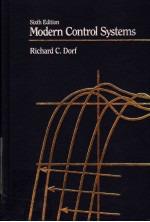图书介绍
MODERN CONTROL SYSTEMSPDF|Epub|txt|kindle电子书版本下载

- RICHARD C.DORF 著
- 出版社: ADDISON-WESLEY PUBLISHING COMPANY
- ISBN:0201517132
- 出版时间:未知
- 标注页数:715页
- 文件大小:40MB
- 文件页数:727页
- 主题词:
PDF下载
下载说明
MODERN CONTROL SYSTEMSPDF格式电子书版下载
下载的文件为RAR压缩包。需要使用解压软件进行解压得到PDF格式图书。建议使用BT下载工具Free Download Manager进行下载,简称FDM(免费,没有广告,支持多平台)。本站资源全部打包为BT种子。所以需要使用专业的BT下载软件进行下载。如BitComet qBittorrent uTorrent等BT下载工具。迅雷目前由于本站不是热门资源。不推荐使用!后期资源热门了。安装了迅雷也可以迅雷进行下载!
(文件页数 要大于 标注页数,上中下等多册电子书除外)
注意:本站所有压缩包均有解压码: 点击下载压缩包解压工具
图书目录
1Introduction to Control Systems1
1.1 Introduction2
1.2 History of automatic control4
1.3 Two examples of engineering creativity7
1.4 Control engineering practice8
1.5 Examples of modern control systems10
1.6 Control engineering design20
1.7 Design example20
Exercises22
Problems23
Design problems29
Terms and concepts31
References31
2Mathematical Models of Systems35
2.1 Introduction36
2.2 Differential equations of physical systems36
2.3 Linear approximations of physical systems42
2.4 The Laplace transform45
2.5 The transfer function of linear systems52
2.6 Block diagram models64
2.7 Signal-flow graph models69
2.8 Computer analysis of control systems75
2.9 Design examples79
2.10 Summary84
Exercises85
Problems92
Design problems110
Terms and concepts112
References112
3Feedback Control System Characteristics115
3.1 Open- and closed-loop control systems116
3.2 Sensitivity of control systems to parameter variations117
3.3 Control of the transient response of control systems121
3.4 Disturbance signals in a feedback control system124
3.5 Steady-state error129
3.6 The cost of feedback132
3.7 Design example134
3.8 Summary137
Exercises139
Problems141
Design problems152
Terms and concepts154
References155
4The Performance of Feedback Control Systems157
4.1 Introduction158
4.2 Time-domain performance specifications159
4.3 The s-plane root location and the transient response170
4.4 The steady-state error of feedback control systems171
4.5 Performance indices176
4.6 The simplilication of linear systems185
4.7 Design example188
4.8 Summary191
Exercises192
Problems196
Design problems204
Terms and concepts205
References205
5The Stability of Linear Feedback Systems207
5.1 The concept of stability208
5.2 The Routh-Hurwitz stability criterion211
5.3 The relative stability of feedback control systems218
5.4 The determination of root locations in the s-plane220
5.5 Design example223
5.6 Summary225
Exercises225
Problems227
Design problems231
Terms and concepts233
References233
6The Root Locus Method235
6.1 Introduction236
6.2 The root locus concept236
6.3 The root locus procedure241
6.4 An example of a control system analysis and design utilizing the root locus method256
6.5 Parameter design by the root locus method260
6.6 Sensitivity and the root locus265
6.7 Design example274
6.8 Summary277
Exercises277
Problems282
Design problems296
Terms and concepts299
References300
7Frequency Response Methods301
7.1 Introduction302
7.2 Frequency response plots304
7.3 An example of drawing the Bode diagram321
7.4 Frequency response measurements325
7.5 Performance specifications in the frequency domain327
7.6 Log magnitude and phase diagrams330
7.7 Design example332
7.8 Summary335
Exercises335
Problems339
Design problems349
Terms and concepts351
References352
8Stability in the Frequency Domain353
8.1 Introduction354
8.2 Mapping contours in the s-plane355
8.3 The Nyquist criterion360
8.4 Relative stability and the Nyquist criterion371
8.5 The closed-loop frequency response378
8.6 The stability of control systems with time delays386
8.7 System bandwidth388
8.8 Design example392
8.9 Summary403
Exercises404
Problems409
Design problems424
Terms and concepts427
References428
9Time-Domain Analysis of Control Systems429
9.1 Introduction430
9.2 The state variables of a dynamic system431
9.3 The state vector differential equation434
9.4 Signal-flow graph state models436
9.5 The stability of systems in the time domain444
9.6 The time response and the transition matrix450
9.7 A discrete-time evaluation of the time response454
9.8 Design example462
9.9 Summary466
Exercises466
Problems470
Design problems483
Terms and concepts485
References485
10The Design and Compensation of Feedback ControlSystems487
10.1 Introduction488
10.2 Approaches to compensation490
10.3 Cascade compensation networks492
10.4 System compensation on the Bode diagram using thephase-lead network497
10.5 Compensation on the s-plane using the phase-leadnetwork504
10.6 System compensation using integration networks512
10.7 Compensation on the s-plane using a phase-lag network515
10.8 Compensation on the Bode diagram using a phase-lagnetwork520
10.9 Compensation on the Bode diagram using analytical andcomputer methods526
10.10 The design of control systems in the time domain527
10.11 State-variable feedback539
10.12 Design example542
10.13 Summary546
Exercises548
Problems552
Design problems567
Terms and concepts570
References571
11Robust Control Systems573
11.1 Introduction574
11.2 Digital computer control system applications574
11.3 Automatic assembly and robots576
11.4 Robust control systems578
11.5 The design of robust control systems583
11.6 Three-term controllers590
11.7 The design of robust PID controlled systems594
11.8 The future evolution of robotics and control systems600
11.9 Summary601
Exercises603
Problems604
Design problems609
Terms and concepts615
References615
12Design Case Studies617
12.1 Engineering design618
12.2 Control system design619
12.3 The design of an X-Y plotter621
12.4 The design of a space telescope control system624
12.5 The design of a robot control system628
12.6 The design of a mobile robot control system631
12.7 The design of an ROV control system633
12.8 The design of a solar-powered racing car motor control system637
12.9 Summary640
Design problems641
Terms and concepts655
References655
Appendix A659
Laplace transform pairs659
Appendix B663
Symbols, units, and conversion factors663
Appendix C665
An introduction to matrix algebra665
Appendix D675
Decibel conversion675
Appendix E677
Complex numbers677
Appendix F683
The Control System Design Program683
Answers to Selected Problems703
Index and Glossary709